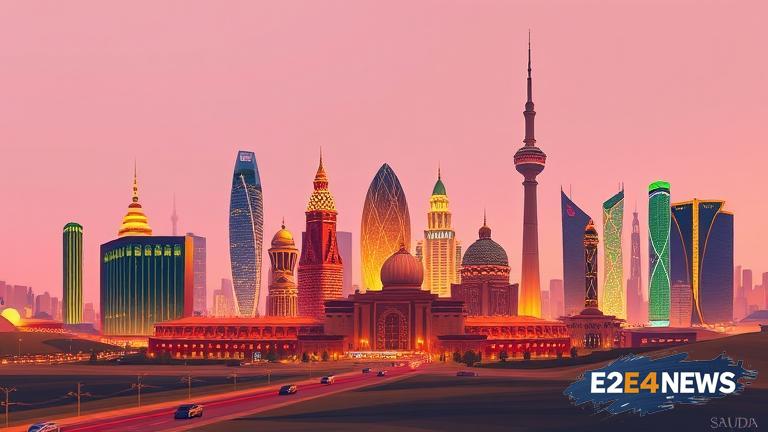Saudi Arabia’s economy has been undergoing a significant transformation in recent years, driven by the government’s Vision 2030 plan. The plan aims to diversify the country’s economy, reduce its dependence on oil exports, and develop new sectors such as tourism, entertainment, and renewable energy. As a result, the country has seen a significant increase in foreign investment, with many international companies setting up operations in the kingdom. The tourism sector, in particular, has seen a major boost, with the government investing heavily in infrastructure and marketing campaigns to attract visitors from around the world. The Red Sea Project, a massive tourism development on the kingdom’s west coast, is one of the most ambitious projects in the region, with plans to create a luxury tourism destination that will attract millions of visitors each year. The project will feature a range of luxury hotels, resorts, and amenities, including a marina, a golf course, and a range of entertainment options. In addition to tourism, the government is also investing in the entertainment sector, with plans to develop a range of new venues and attractions, including a new opera house in Riyadh. The kingdom is also investing heavily in renewable energy, with plans to generate 50% of its electricity from solar and wind power by 2030. The government has set a target of generating 27.3 gigawatts of renewable energy by 2023, and has already begun construction on a number of major solar and wind farms. The country’s economy is also being driven by a range of other factors, including a growing population, a highly skilled workforce, and a favorable business environment. The government has implemented a range of reforms to make it easier for companies to set up and operate in the kingdom, including the introduction of a new bankruptcy law and the establishment of a number of special economic zones. As a result, the country has seen a significant increase in foreign investment, with many international companies setting up operations in the kingdom. The kingdom’s economy is also being driven by a range of major infrastructure projects, including the development of a new metro system in Riyadh and the expansion of the kingdom’s airports. The government is also investing in the development of a range of new technologies, including artificial intelligence, blockchain, and the Internet of Things. The kingdom is also home to a number of major companies, including Saudi Aramco, the world’s largest oil company, and SABIC, one of the world’s largest chemical companies. The country’s economy is expected to continue to grow in the coming years, driven by the government’s reforms and investments in key sectors. The kingdom’s GDP is expected to reach $1.7 trillion by 2025, up from $1.2 trillion in 2020. The country’s population is also expected to continue to grow, with the number of citizens expected to reach 35 million by 2030. The government is also investing in the development of a range of new industries, including manufacturing, logistics, and finance. The kingdom is also home to a number of major universities and research institutions, including King Saud University and the King Abdullah University of Science and Technology. The country’s economy is also being driven by a range of major events, including the annual Janadriyah festival, which attracts millions of visitors each year. The kingdom is also home to a number of major cultural attractions, including the National Museum of Saudi Arabia and the Masmak Fortress. Overall, Saudi Arabia’s economy is experiencing a significant boom, driven by the government’s reforms and investments in key sectors. The country is expected to continue to grow and develop in the coming years, driven by its highly skilled workforce, favorable business environment, and range of major infrastructure projects.
